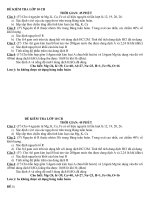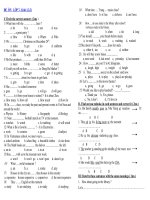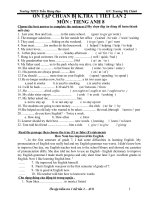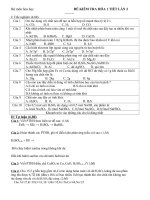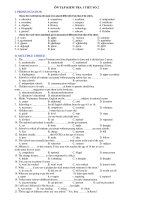- Trang chủ >>
- THPT Quốc Gia >>
- Ngoại Ngữ
On tap kiem tra mot tiet lan 2
Bạn đang xem bản rút gọn của tài liệu. Xem và tải ngay bản đầy đủ của tài liệu tại đây (85.33 KB, 6 trang )
REVISION FOR THE SECOND TEST
Objective(s): By the end of the lesson, Ss will be able to
- Common competencies:
+ Promote their cooperative and communicative learning (pair work, group work)
+ Improve communication skill through exercises.
+ Enrich vocabulary through exercises.
-Language competencies:
+Review vocabulary in unit 456
+Master the use of passive voice, relative pronouns, if clauses
SAMPLE TEST 1
A. Vocabulary and grammar
I. Choose the best option :
1. Ms Young, to _______ many of her students are writing, is living happily and peacefully in Canada.
A. who
B. whom
C. that
D. whose
C. for
D. on
2. His ideas about marriage are quite different ______ mine.
A. with
B. from
3. You are old enough. I think it is high time you applied _______ a job
A. in
B. of
C. for
D. upon
4. The preparations _______ by the time the guests _______.
A. had been finished / arrived
C. have finished / arrived
B. had finished / were arriving
D. have been finished / were arrived
5. What would Tom do if he ____ the truth?
A would know
B. has know
C. knows
D. knew
C. hear
D. didn’t hear
6. I won’t wake unless I ______ the alarm.
A. don’t hear
B. heard
7. The young man who lives next door is very kind to my family.
A. to live next door
B. he lives next door
B. living next door
D. lived next door
8. Nam: “Why don’t we go to eat out? “ – Mai …………………..
A. Oh .That’s a great idea.
C. What ‘s the matter with you?
B. You are so well
D. Thank you
1
9. Qualifications and ……………are two most important factors that help you get a good job.
A. politeness
B. experience
C. attention
D. impression
10. John cannot make a …..to get married to Mary or stay single until he can afford a house and a car.
A. decide
B. decision
C. decisive
D. decisively
11. Can you please tell me some information that _______ to the job?
A. indicates
B. expresses
C. interests
D. relates
12. It is often a good idea to start with small, easily _______ goals.
A. achieve
B. achievement
C. achievable
D. achiever
13. What a nice hat you have got!
A. Thank you. That’s a nice compliment.
C. I find it very nice
B. Oh I don’t think it is nice
D. I think so
14. At 5 o’clock yesterday evening , I …………………….my clothes
A. am ironing
B. have ironed
C. ironed
D. was ironing
15. My wedding ring ……………of yellow and white gold .
A. is made
B. is making
C. made
D. makes
C. had learned
D. learn
C. not to work
D. not working
16. I ……………lots about the job so far
A.have learned
B. am learning
17.You can use my phone if yours_______.
A. don’t work
B. doesn’t work
18.“Would you like to spend the weekend with us?”
A. They invited her to spend the weekend with us.
B. They invited her to spend the weekend with them.
C. They reminded her to spend the weekend with them.
D. They reminded her to spend the weekend with us.
19 …………..,he wouldn’t have missed the train
A. If he listened to me
B. Unless he listened to me
C. If he had listened to me
D. If he didn’t listed
20. Qualifications and _______ are two most important factors that help you get a good job.
A. politeness
B. experience
C. attention
D. impression
21. Before the interview, you have to send a letter of application and your résumé to the company.
A. recommendation
B. reference
C. curriculum vitae
22. A letter of _________ is sometimes really necessary for you in a job interview.
2
D. photograph
A. recommend
B. recommendationC. recommended
D. recommender
23. Students usually ………………...their GCSEs at the age of sixteen
A. pass
B. make
C. take
D. follow
24. Jack London wrote several ______ novels on adventure.
A. interesting
B. interested
C. interest
D. interestingly
25: What are the ____________ between women’s in old times and women in modern times?
A. differs
B. difference
C. differences
D. different
C. applicant
D. applying
26 He was the only _______ that was offered the job.
A. apply
B. application
27. You may jot down your qualifications and experience.
A. mention
B. find out
C. note down
D. type
28.The major goals of primary education is to achieve basic literacy and numeracy among all students.
A
B
C
D
29.The purpose of secondary education is to give common knowledge and to prepare for either higher
education and vocational education.
A
B
C
D
30. Higher education in the United States specifically refers to post secondary institutions, that offer
associate degrees, master
A
B
C
degrees or Ph.d. degrees or equivalents.
D
31. Economic reform usually refers to actions of the government to improve efficiency in economy
markets.
A
B
C
D
PHONETICS
II.Choose the word that has underlined part is pronounced differently from the others
32.
A. songs
B. photographs
C. schools
D. yards
33
A. economy
B. industry
C. identify
D. priority
34.
A. though
B. encourage
C. enough
D. country
3
III. Choose the word which is stressed differently from the rest.
35.
A. environment
B. renovation
C diversity
D. relationship
36.
A. shortage
B. stagnant
C. dominate
D. priority
WRITING
Transfornation sentence
37. He is ill, so he can not participate in the match.
A. If he is ill, he can not participate in the match
B. If he were ill, he could not participate in the match.
C. If he were not ill, he could participate in the match.
D. If he were ill, he can participate in the match
38. Why don’t we go for a walk? Jane said
A. Jane suggested going for a walk.
B. Jane promised to go for a walk.
C. Jane remined me to go for a walk.
D. Jane asked me to go for a walk.
39. People is believed13 is an unlucky number.
A. It was believed that 13 is an unlucky number.
B. That 13 is an unlucky number is believed.
C. 13 is believed to be an unlucky number.
D. 13 is believed to have been an unlucky number
40. Choose the sentence which has the closest meaning to the sentence in italics
“ How about spending the day at the beach ?” said Tom.
A. Tom said they wanted to spend the day at the beach.
B. Tom insisted on spending the day at the beach.
C. Tom suggested spending the day at the beach
D. Tom advised us to spend the day at the beach
READING
Read the passage carefully and choose the correct answer.
Communication in general is process of sending and receiving messages that enables humans to share
knowledge, attitudes, and skills. Although we usually identify communication with speech,
communication is composed of two dimensions - verbal and nonverbal.
4
Nonverbal communication has been defined as communication without words. It includes apparent
behaviors such as facial expressions, eyes, touching, tone of voice, as well as less obvious messages
such as dress, posture and spatial distance between two or more people.
Activity or inactivity, words or silence all have message value: they influence others and these others,
in turn, respond to these communications and thus they are communicating.
Commonly, nonverbal communication is learned shortly after birth and practiced and refined
throughout a person's lifetime. Children first learn nonverbal expressions by watching and imitating,
much as they learn verbal skills.
Young children know far more than they can verbalize and are generally more adept at reading
nonverbal cues than adults are because of their limited verbal skills and their recent reliance on the
nonverbal to communicate. As children develop verbal skills, nonverbal channels of communication do'
not cease to exist although become entwined in the total communication process.
41. According to the writer, ……………………….
A. People communicate with both verbal and nonverbal language.
A. Nonverbal language is only used by the deaf and the mute.
B. One cannot communicate in both verbal and .nonverbal language.
D. Those who can listen and talk should not use nonverbal language.
42. Which is not included in nonverbal communication?
A. words
B. spatial distance
C. facial expressions
D. tone of voice
43. We can learn from the text that …………………………..
A. nonverbal can never get any responses
B. most people do not like nonverbal communication
C. even silence has message value
D. touching is not accepted in communicating
44. Human beings ………………………………..
A. have learnt how to communicate in nonverbal language through books
B. can communicate in nonverbal language only when they are mature
C. have learnt how to communicate in nonverbal language since a child
D. communicate in nonverbal language much less than they do in verbal language
45. The word reading has a close meaning to ________.
A. looking at the words that are written
B. expressing
B. saying something aloud
D. understanding
5
II. Fill in each numbered blank with one suitable word or phrase.
The General Certificate of Secondary Education or the GCSE examinations for short are the standard
school-leaver qualifications taken by virtually all UK students in the May and June following their 16th
birthday. If you come to a UK (46) ………………….school before you
(47) ……………….. the age of 16, you will study towards GCSE examinations in up to 12 subjects.
Some subjects are compulsory, including English arid mathematics, and you can select others, such as
music, drama, geography and history from a series of options. GCSEs provide a good all-round
education (48) ……………. you can build on at college and eventually at university.
AS- and A-levels are taken after GCSEs. They are the UK qualifications most
(49) ………………… accepted for entry to university and are available in subjects from the
humanities, arts, sciences and social sciences as well as in practical subjects such as engineering, and
leisure and tourism. You can study up to four subjects at (50) ………………. same time for two years,
taking AS-level examinations at the end of your first year (called the lower-sixth) and A-level
qualifications at the end of your second year (called the upper-sixth).
46.
A. dependence
B. independence
C. independent
D. independently
47.
A. reach
B. come
C. approach
D. go
48
A. what
B. that
C. where
D. whose
49.
A. wide
B.widely
C. width
D. widen
50.
A. a
B. an
C. the
D. Ø
6
